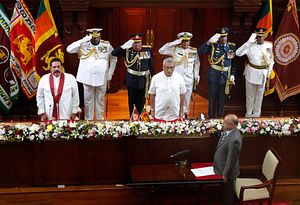Barely two weeks into office, it appears that Sri Lanka’s new government may follow up on one of its election manifesto promises: a bid to renegotiate the terms of its 99-year-lease on the port of Hambantota to a Chinese firm. As I discussed recently at The Diplomat, Gotabaya Rajapaksa and the Sri Lanka Podujana Peramuna had pledged in their manifesto before the 2019 presidential elections that they would seek to revisit the debt-equity swap agreement, which was effectuated under the previous government of Prime Minister Ranil Wickremsinghe under Maithripala Sirisena’s presidency. In July 2017, a deal saw the port transfered to China Merchant Port Holdings—a massive, partially state owned Chinese holding company—on a 99 year lease.
In a recent interview, Ajith Nivard Cabraal, a former central banker in Sri Lanka and now adviser to Mahinda Rajapaksa, the former president who oversaw the initial agreement to develop Hambantota with China and current prime minister, made the new government’s goal clear. “We would like them to give it back,” he said. “The ideal situation would be to go back to status quo. We pay back the loan in due course in the way that we had originally agreed without any disturbance at all.”
In the election manifesto, Gotabaya and the SLPP had said the “Hambantota port is a national asset and was defined as a strategic asset by us previously, and the intention was never to sell or lease the port for 99 years.” The document added that, if victorious, the new government would “make it a priority to revisit the already signed agreement with the Chinese government and explore ways as to how best we could bring about a win-win for the two countries.”
Since 2017, Hambantota‘s fate has become the poster child for criticism of China’s Belt and Road Initiative and its “debt-trap” diplomacy. Even though the series of events that led to the debt-equity swap had been initiated by Mahinda Rajapaksa as early as 2007, it appears now as if the new Sri Lankan government—which includes Mahinda as prime minister—is treading a familiar path in revisiting previous obligations to China.
In this sense, Sri Lanka’s relationship with China may resemble the one that new governments in Pakistan and Malaysia last year adopted. Both Prime Minister Imran Khan in Pakistan and Prime Minister Mahathir Mohamad of Malaysia sought to revisit and renegotiate investment agreements cinched by their predecessors with China. Mahathir has been more successful on this front, but the experience may have shown Sri Lanka that sovereign agreements can have flexibility. Myanmar too was successful in reducing certain obligations to Chinese state firms.
For now, the Chinese government appears unfazed about the possibility of Hambantota throwing a wrench in Sino-Sri Lankan relations. “China-Sri Lanka cooperation, including the Hambantota port project, are built on the basis of equality and consultation,” the Chinese Ministry of Foreign Affairs said in a statement, according to Bloomberg News. “China looks forward to working with Sri Lanka to make Hambantota a new shipping hub in the Indian Ocean and developing the local economy,” the statement also added.
For now, what is apparent that the political will to revisit the Hambantota Port deal has survived the election itself and, true to the manifesto, appears to be a priority of the new government. How exactly Colombo might proceed with Beijing, however, remains an open question.

































